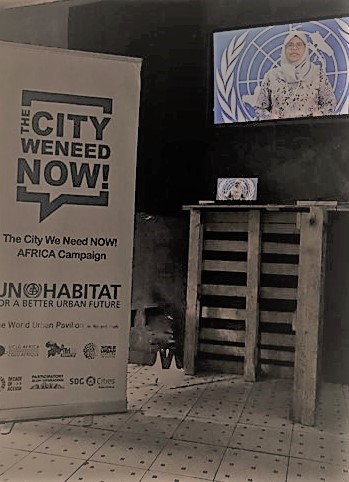8 March 2021 - Youth leaders and researchers from Mathare, one of the biggest informal settlements in Nairobi, last month marked the Africa launch of the World Urban Campaign The City We Need Now!
The advocacy campaign is led by UN-Habitat and the 200 partner organisations of the World Urban Campaign. For 2022, the campaign is calling for urgent action to accelerate the implementation of the New Urban Agenda in Africa, the Middle East, Asia Pacific, Europe and the CIS, Latin America and the Caribbean, and North America.
UN-Habitat Executive Director Maimunah Mohd Sharif said the campaign is particularly important because many Africa countries are not on course in meeting the implementation of the 2030 Sustainable Development Goals (SDG) and New urban Agendas needed to receive more emphasis.
“Africa will have the world’s fastest growing urban and youth population over the next 30 years and like all other regions, it is off-track to achieve the SDGs by 2030. By putting cities, and more importantly secondary cities, at the heart of national urban strategies, national and local leaders will give a second chance to Africa, leaving no one and no place behind,” she said in a video message.

The February 16 launch took place at the Mathare Environmental One Stop Youth Centre. Some of those present at the event are being engaged in a series of workshops as part of the capacity-building efforts for local youth to support the pilot implementation of the SDG Cities programme in Mathare and in Mombasa.
Moreover, the focus of the trainings is also to increase the capacity of young people to undertake research that could be used to develop policy and programmes that address community needs.
The training is part of the SDG Cities programme which seeks to engage cities and their residents in aligning community planning and action towards the SDGs and sustainable urbanisation.
At the workshops, community leaders learned about various qualitative research methods such as semi-structured interviews, focus groups, ethnographic observation, community mapping, as well as what it takes to ensure ownership and meaningful participation of the researched population.
‘‘To get the cities we need, we need research by and for the community,’’ said George Gachie, UN-Habitat Community Coordinator for the Participatory Slum Upgrading Programme said in the opening of the event. ‘‘Research such as this is key to creating more sustainable and equitable communities that leaves no on behind.’’
Carolyne Mbithe, 26, Gender Specialist for Mathare Roots, said the workshops taught her need skills.
‘‘At the research workshops I’ve learned different research methodologies and different approaches and methods of tackling research questions …It made me further realise that after research is conducted I need feedback from the community to validate it,’’ she said.
The City We Need Now! has 10 thematic focuses, including 1) Health and well-being, 2) Peace and safety, 3) Climate adaptation and resilience, 4) Inclusion and gender equality, 5) Economic opportunities for all, 6) Culture and identity, 7) Local governance, 8) Urban planning and design, 9) Housing, services and mobility, and 10) Learning and innovation. The first regional launch of the global urban campaign (for the Middle East region) was hosted by Dubai, the United Arab Emirates.